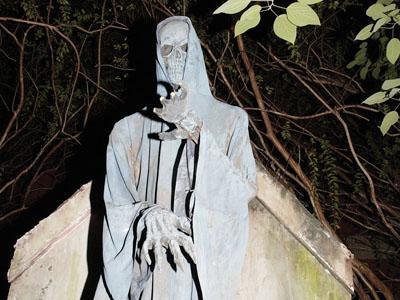Students can get thrills and scares through normal Halloween entertainment like horror movies and haunted houses.While a quick trip through The 13th Gate might make a student lose sleep at night, the processes and theories behind being scared are more complex than a simple walk through a haunted house.”Becoming scared depends on many, many things,” said Thompson Davis, an assistant psychology professor at the University who specializes in fear and anxiety disorders. “There are a lot of psychological and environmental influences that work together to make us scared.”Davis said fears are individualized, and most are tied to past memories or experiences, which can become stimuli for fear in the future. People learn to be afraid during their lifetimes, and a stimulus can bring back that fear and cause a reaction once they attach the emotion to memories.These fears, worries and anxieties are learned through a combination of four different methods, Davis said. People learn to be afraid through direct conditioning experiences, being bitten by a dog; through modeling, seeing someone act afraid around a dog; through negative information, someone telling you dogs are evil; and through a biological or hereditary vulnerability to anxiety and fear.Davis said most people develop a stimulus through varying combinations of the four processes.Once a stimulus affects a person, a natural response shoots through the body and activates an automatic process which triggers the nervous system, said John Caprio, biological sciences professor.Caprio said once the brain recognizes the situation, the sympathetic nervous system takes over, causing a tightening of the muscles and almost shutting down blood flow to certain organs, like the stomach and intestines, to force more blood to the heart in preparation for the fight-or-flight response.”Fight-or-flight is a really unique response,” Caprio said. “Your body naturally and quickly reacts to the situation, and it decides what action it is going to take really quickly. Blood is shifted to where it is needed most, and you are prepared for whatever happens.”Davis said the sense of relief one experiences after being afraid comes from the body trying to balance itself. The body kicks in to return itself to typical levels of functioning and the compensatory action continues after the fear subsides, giving a person a momentary good feeling.These emotions and highs are what thrill-seekers and horror fans experience when they look for the next scare.”Exploring our emotions is a healthy thing,” Davis said. “With horror, like movies and haunted houses, we ultimately know it is a safe environment, but we go along with it because we want the same experiences.”Tracy Stephenson Shaffer, performance studies professor and horror expert, saw “The Exorcist” when she was 6 years old, and she said she has loved every type of horror since.”The illusion of being scared is thrilling,” Shaffer said. “We are already aware that it is not real, but we produce the situation ourselves. So we put aside our disbelief for a while and let go of our worries.”Shaffer explained horror is often a metaphor for real-life situations and a return of repressed emotions people can’t articulate, embodying themselves as the monster.”The real monster is something that is happening in the world outside,” Shaffer said. “If we can visualize that fear, even subconsciously, it is easier for us to deal with it. So much of horror is a metaphor for life experiences, but often times that ‘monster’ may not go away.”Dwayne Sanburn, owner of The 13th Gate, has seen hundreds of thousands of people go through his haunted house and can see why so many people like to be scared.”People experience fear vicariously,” Sanburn said. “You can scream and be scared, but you come out the other side laughing. You know it’s fake.”Sanburn said Halloween is one of the few holidays during which people can actually relieve stress instead of building it, but a suspension of disbelief is necessary.”Some people come through and say, ‘You won’t scare me,’ and often times they aren’t,” Sanburn said. “So you have to willingly immerse yourself into a ‘real’ scenario and believe it is real.”Several students around campus will gladly put aside their disbelief for those few hours of horror.”I love the thrill of not being able to sleep at night,” said Lindsay Bradshaw, business freshman. “Before you watch a movie, you don’t think about [the horror], but once it’s on your mind, it just stays with you.”Clint McFerren, biology sophomore, hasn’t been to the 13th Gate yet, but has experienced other haunted houses.”While you are being scared, it isn’t fun, but at the end you come out all right and feeling good,” McFerren said. “We go into things wanting to be scared, so we create that illusion — and for $20, I want to be scared.”–Contact Jake Clapp at jclapp@lsureveille.com
Complex internal processes define how humans react to horror
October 28, 2009

The 13th Gate features an outdoor “haunted” cemetary.





